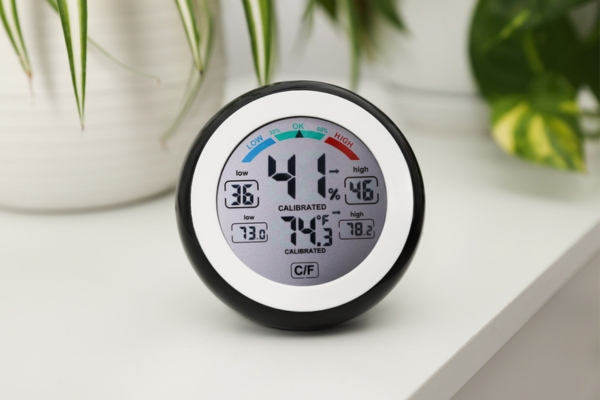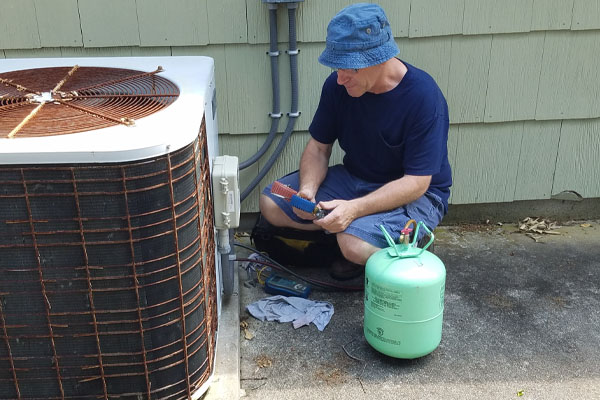Beyond Cool Air: Unveiling Air Conditioning Sickness

Stepping into an air-conditioned room during summer can be a soothing respite from the oppressive heat. However, for a considerable number of people, this comfort is soon marred by symptoms like headaches, fatigue, and breathing problems, often attributed to what’s known as air conditioning sickness. This widespread issue highlights the potential adverse effects of air-conditioned settings on our health.
As a leading provider of HVAC solutions, Point Bay Fuel delves into this issue, providing essential insights and actionable steps to create healthier indoor environments. This article investigates the causes, symptoms, and preventive tactics for air conditioning sickness, ensuring your comfort doesn’t jeopardize your health.
Understanding Air Conditioning Sickness
Contents
Here’s what you need to know about AC sickness:
Definition & Symptoms of Air Conditioning Sickness
Air conditioning sickness occurs when individuals experience adverse effects from extended time in air-conditioned spaces. This condition frequently manifests as headaches, dizziness, dry throat, itchy eyes, and respiratory difficulties. These symptoms cause discomfort and diminish overall productivity and quality of life, underscoring the importance of understanding air quality in controlled settings.
Ensure your indoor comfort with Point Bay Fuel’s dependable air conditioning solutions. Contact us today for personalized service.
Causes of Air Conditioning Sickness

Multiple factors lead to air conditioning sickness, centering primarily on air quality and the environmental conditions in air-conditioned areas. Poor ventilation can cause stale air accumulation, drastically reducing indoor air quality. Biological contaminants like mold, bacteria, and pollen can proliferate in inadequately maintained air conditioning units, intensifying health problems. Chemical pollutants from indoor sources such as paints, varnishes, and cleaning agents may also degrade the air.
Psychological factors and the placebo effect may also shape how individuals perceive and experience symptoms in air-conditioned settings. Recognizing these causes is essential for preventing and reducing the impact of air conditioning sickness.
How Air Conditioning Can Trigger Illness
Here are some ways that air conditioning can lead to illness:
The Importance of Temperature & Humidity Control

Effective temperature and humidity management is crucial for sustaining a healthy indoor climate. Incorrect adjustments in these areas can markedly worsen symptoms related to air conditioning sickness. Excessively cold environments may heighten respiratory symptoms and discomfort because colder air tends to be drier and can aggravate the airways.
Likewise, low humidity can dehydrate the mucous membranes in the nose and throat, increasing vulnerability to infections and intensifying symptoms such as sore throats and itchy eyes. Keeping humidity and temperature at optimal levels is critical to avoiding these health problems and maintaining comfort and well-being in air-conditioned environments.
Stay cool and comfortable. Contact Point Bay Fuel for expert guidance and dependable air conditioning services.
Air Quality Concerns
Ensuring adequate air exchange rates is crucial in air-conditioned spaces to maintain healthy indoor air quality. Insufficient air exchange can lead to stagnant air, promoting the buildup of pollutants and allergens.
This stagnation can worsen problems associated with air conditioning sickness, as contaminants like dust, pollen, and volatile organic compounds stay confined indoors, diminishing the air quality. To counter these risks and preserve a healthy indoor atmosphere, it’s critical to ensure that air conditioning systems are correctly designed and maintained to allow for consistent air exchange.
Preventing Air Conditioning Sickness
Here are some tips on how to prevent air conditioning sickness:
Regular Maintenance of HVAC Systems

Routine maintenance of HVAC systems is a key measure to prevent air conditioning sickness. Regular cleaning and timely filter replacement are essential to eliminating air contaminants and enhancing overall air quality.
HVAC systems require professional inspections and maintenance at least once a year to avoid the accumulation of pollutants and ensure efficient operation. Regular upkeep improves the health of indoor environments, prolongs the equipment’s lifespan, and can result in energy savings by enhancing the AC system’s efficiency.
Improving Indoor Air Quality
Boosting indoor air quality is essential for preventing air conditioning sickness. A practical approach is to enhance ventilation with outdoor air. This can be accomplished by occasionally opening doors and windows to let fresh air flow or installing ventilation systems that mechanically bring in outdoor air.
Additionally, employing air purifiers can help eliminate airborne contaminants like pollen, dust, and bacteria, reducing the potential triggers of air conditioning sickness. Dehumidifiers are also vital, particularly in humid climates, as they help maintain ideal humidity levels and inhibit the growth of mold and mildew. These measures, when combined, can significantly enhance the air quality in air-conditioned areas, fostering a healthier indoor atmosphere.
Best Practices in HVAC Settings

Adopting optimal temperature and humidity settings is crucial to minimize health risks associated with air conditioning sickness. Generally, keeping temperatures between 72°F and 78°F and maintaining humidity levels from 40% to 60% can help establish a comfortable and healthy indoor climate.
Personal adjustments and accommodations are equally crucial in shared spaces to meet individual comfort levels and health requirements. HVAC systems can be fine-tuned easily, and personal fans or heaters can also be utilized. Implementing these best practices in HVAC settings enhances individual comfort and supports overall health and well-being in environments reliant on artificial climate control.
Let Point Bay Fuel assist you with your cooling needs. Contact us for prompt and professional service.
When to Seek Professional Help from an HVAC Company
Addressing the challenges of air conditioning sickness often goes beyond simple self-management; recognizing when to involve professionals is crucial for effectively tackling and reducing its effects on health.
Signs That a Professional HVAC Contractor is Needed

Knowing when to ask a professional for assistance is essential for managing air conditioning sickness effectively. Persistent symptoms associated with air-conditioned settings, like continuous headaches, respiratory problems, or allergic responses, signal the need for an expert evaluation.
Furthermore, if these symptoms consistently alleviate when you are outside of air-conditioned environments, the indoor setting might aggravate health problems. In these instances, seeking advice from HVAC professionals or indoor air quality specialists is crucial. They can offer insights and solutions to reduce these health risks and ensure that the air conditioning system positively affects the indoor environment rather than negatively.
Consulting with HVAC Professionals

Consulting with an HVAC expert, such as Point Bay Fuel, can be crucial in diagnosing and resolving issues related to air conditioning sickness. These professionals possess advanced diagnostic tools and techniques that can accurately pinpoint HVAC system problems contributing to health symptoms and poor air quality.
Point Bay Fuel can deliver targeted solutions that improve indoor air quality and ensure the HVAC system is optimized for comfort and health by thoroughly evaluating elements like filtration, ventilation, and humidity control. This professional approach not only addresses immediate issues but also helps prevent future instances of air conditioning sickness.
Conclusion
Understanding and actively preventing air conditioning sickness is vital for maintaining a healthy indoor environment. This article has emphasized identifying symptoms, uncovering causes, and adopting prevention strategies. Regular HVAC maintenance and optimal air quality management are critical. Point Bay Fuel advocates for proactive actions to keep your HVAC systems in top condition and ensure good indoor air quality. By taking these steps, you enhance comfort and promote health in air-conditioned spaces.
Call Point Bay Fuel For All Your HVAC Needs
Contact Point Bay Fuel for premier heating and cooling solutions in your county and state. Our team comprises professionally certified technicians specializing in various HVAC services, including routine maintenance, repairs, system upgrades, and installations. We are dedicated to providing your HVAC system with the highest care and service.
Point Bay Fuel takes pride in offering high-quality heating and cooling services that are also affordable. Our maintenance services enhance your comfort and your system’s energy efficiency, ultimately reducing heating and cooling costs. Whether you need repairs or replacements, we provide cost-effective solutions tailored to your unique needs, all guaranteed to satisfy. Contact Point Bay Fuel today for a free in-home estimate or to schedule a service visit.
Contact us now by calling (732) 349-5059 to speak to one of our home comfort specialists! Click the link to view our service area.

Related Articles:
- Air Conditioning: More Than Cooling – Unveiling Unexpected Health Benefits
- What Should You Do If Your Air Conditioner Airflow Is Weak?
- Air Conditioner Care Guide: Steer Clear Of These 3 Bad Habits
- Unveiling the Truth: Rust on Your Air Conditioner Condenser
- Attic Air Conditioners: Essential Features to Keep in Mind
